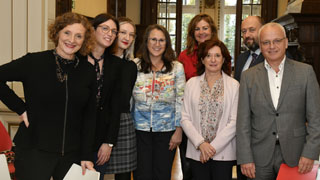Housing for the Common Good - An inspiration for Ukraine and Europe
An exchange on the Viennese and Austrian model took place on 24 October 2023 at the Vienna House in Brussels.

Michaela Kauer (director of the Vienna House), Anna Iafisco (Eurocities), Vita Shnaider (New Housing Policy), Julie Lawson (RMIT University), Barbara Steenbergen (International Union of Tenants), MEP Estrella Durá Ferrandis, Grzegorz Gajda (European Investment Bank), Wolfgang Amann (I•IBW - Institut für Immobilien, Bauen und Wohnen GmbH)
Since the past months, Ukrainian housing experts have been working together with important housing actors and housing researchers from Europe on concrete ideas to ensure affordable housing for the people in Ukraine already now, but especially for the time after the war. On 24 October 2023, a first result of this cooperation under the title "Rebuild a place called home" was presented at the Liaison Office of the City of Vienna in Brussels.
In her introduction, MEP Estrella Durá Ferrandis reported on the ongoing work of the European Parliament in the field of housing: "Housing must be seen as a human right, and for this we need better framework conditions for public investment", she emphasised and proposed the creation of a "European Housing Fund". The director of the Vienna House, Michaela Kauer, brought greetings from the Mayor of Vienna, Michael Ludwig, who was pleased that the Viennese model of social and affordable housing is taken as a good example for the reconstruction in Ukraine. Among the numerous guests were the head of the Brussels office of the International Tenants' Association, Barbara Steenbergen, partners from the upcoming EU Presidency country Belgium, UN-Habitat, Eurocities, the Committee of Regions and colleagues from other city and regional offices.
Housing at the heart of Ukraine's reconstruction
The ongoing initiative "Rebuilding a place called home" aims at creating a housing support system in Ukraine that can enable broad access for all and is based on a differentiated offer. In this context, authors Prof. Julie Lawson, Dr. Wolfgang Amann, Oleksandr Asimov and Pavlo Fedoriv elaborated a paper "Common Good Housing" which calls for a systematic approach to the reconstruction of Ukraine based on good examples from Europe. At the event in the Vienna House, Vita Shnaider, Ukrainian housing researcher and member of the NGO "New Housing Policy", reported on the situation in her country. She said that it is crucial to develop legislative mechanisms for long-support of non-profit and low-profit housing projects within the social housing system in Ukraine; currently the framework conditions for this are not yet in place.
Julie Lawson, Professor at the Royal Melbourne Institute of Technology, Australia and lead housing researcher for the Housing 2030 project of UNECE, stressed the importance of learning from each other and bringing together the best examples of how to solve concrete problems. "Colleagues from academia and civil society in Ukraine are incredibly committed to putting housing at the heart of reconstruction". It is now important to ensure that this is also the case in the design of aid to Ukraine on a broader scale.
Solution to the housing problem needs a strong legal basis
Part of the experts' proposal is a draft law on common good housing, which, following the Austrian model, includes general definitions of the structure, business model and tasks of non-profit housing developers as well as regulations on costs, audit and supervision. Wolfgang Amann, coordinator of the proposal, which is based on the 200-pages Austrian Limited-Profit Housing Act, emphasised: "we have summarised the most important elements here in 18 articles". He said that the successful system in Austria cannot be copy-pasted, but it is meant as an orientation; important elements in non-profit housing include cost rent, the return of surpluses to the system, tied assets, a clear limitation of the business activities and strict audit and supervision. The Austrian model of limited-profit housing has recently been formally approved as the Austrian contribution to the “New European Bauhaus Rebuild Ukraine Initiative".
Look for long-term and stability in financing
Grzegorz Gajda, senior economist at the European Investment Bank (EIB), pointed out that the EIB has a long-standing of experience with housing, "even in very different national contexts." It is good to think about building non-profit housing associations and other models that ensure affordable housing and to start with concrete projects now, he said.
In the lively debate moderated by Anna Iafisco from Eurocities that followed, it became clear that the interest in a strong non-profit sector goes far beyond Ukraine. Michaela Kauer addressed the question of transferability of systems and strategies from her experience as coordinator of the EU Urban Agenda partnership on housing: "Many things that are taken for granted by Viennese citizens are not known in other cities and countries. Therefore, it is important for us to get involved in European projects and organisations that promote exchange and learning from each other, such as the EU Urban Agenda. In the latter, we have developed an action plan, together with cities, member states, stakeholders, EU-institutions and academia, to highlight what is needed for good housing policy. It is gratifying that the discussion at the European level is moving more and more in the direction of social, affordable and non-profit housing for all."
Chief Executive Office - European and International Affairs
Contact form
